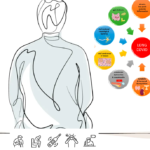Assisted reproductive technologies (ART) have become established procedures performed around the world, yet there are still many unanswered questions regarding safety. The success of ART is not guaranteed, and patients often have to undergo more than one cycle of treatment before they are successful. This naturally varies from person to person, hence vital to be fully informed and prepared as one enters the process.
Understanding all the possible side effects can be helpful in coping with any issue that might arise, and help one look out for any serious problems and reach out for help.
Some side-effects which women face during an IVF cycle include:
The egg retrieval procedure is performed under mild sedation, and the anesthesia used may have some mild side effects, such as:
- Headaches
- Nausea or vomiting
- Increased/ decreased urinary frequency
- Mood swings
- Faintness
- Breast tenderness
- Abdominal pain
- Mild abdominal bloating
- Constipation
- Mild cramping
- Mild fluid or vaginal bleeding
The embryo transfer process is quicker and easier, and generally has less chance of side effects, but one can experience some of the same symptoms.
Possible risks associated with Infertility treatments include:
Infections: The egg retrieval and embryo transfer may leave minor chances of infections in the women undergoing the treatment.
Drug Reaction: As a medical treatment, ART includes procedures like ‘Ovulation Induction’, involving drugs to regulate the cycle and induce ovulation before the egg retrieval procedure. This comes with a small chance of developing side effects, the most severe of these being ovarian hyper-stimulation syndrome (OHSS). Fortunately, the use of fewer or no drugs in natural and mild IVF cycles means that the already small likelihood of developing unwanted risk of OHSS is dramatically decreased or eliminated. However, recently with the use of newer drugs such as GnRH agonists for trigger and freezing embryos and not replacing them in the same IVF cycle has brought down the risk of OHSS to almost nil in good clinics.
Multiple Pregnancies: Most IVF treatments include insertion of more than one embryo into the uterus of the woman, and this leads to a higher likelihood of multiple pregnancies (twins, triplets or more). The risks to the health of both- babies and mothers are considerably higher and more serious than single pregnancy. There is an increased chance of premature labour, miscarriage, need for caesarean, stillbirth and infant health problems with multiple pregnancies.
At MotherToBe, we have robust single embryo transfer policies, to avoid the risks of multiple pregnancies and focus on the reduction of multiple births.
Ectopic Pregnancy: IVF process involves placing an embryo directly into the uterus, in rare cases ectopic pregnancy may occur. An ectopic pregnancy is a condition where an embryo gets implanted in the fallopian tube rather than the uterus. This cause an abnormal rise in pregnancy hormones, abdominal pain, and possible vaginal bleeding.
Miscarriage: The rates of miscarriage after IVF are similar to natural conception. Pregnancy loss can feel even more devastating after having gone through such an intense process.
Premature births and low birth weights: During pregnancy with the help of an IVF cycle, there is a very rare chance of a smaller or earlier baby than natural conception. This is more commonly seen in twin pregnancies. However in singleton pregnancies the additional risks of IVF pregnancy is virtually eliminated. Low birth weight is only associated with fresh embryo transfers. Low birth weight is no longer seen in IVF cycles using previously frozen embryos (known as frozen embryo transfer or FET).
Emotional & Psychological Toll: Going through IVF treatment can be a highly emotive and stressful experience. For those undergoing treatment – the high levels of hormones, the frequent visits to the clinic, and all the pressure of following medication protocols and undergoing invasive procedures, it can be physically and emotionally demanding. For partners it can be difficult to watch a loved-one go through a stressful and strenuous experience.
For women, questions of how to deal with genetic screening and the storage, donation, or disposal of unhealthy or unused embryos are common. Even if a patient is well aware of herself and these topics, she may feel compelled to hide her fertility treatment from judgmental relatives or community. This can add to the sense of isolation and stress she feels during the treatment. Keeping all these factors in mind, for better results and increased effectiveness it is important to prioritize ones psychological health while undergoing the IVF cycle. We at MotherToBe provide counseling for a holistic well-being of couples undergoing an Assisted Reproductive Technology procedure.
Other Factors
Financial Issues: IVF treatment might be expensive, depending on the requirements of the IVF Cycle. And after paying for the medications, blood tests and other required tests, the costs can quickly mount up. It is good to have a clear idea of the costs involved before starting the treatment, and to have all finances in order before beginning of the cycle. With fewer drugs, the cost of a cycle is reduced at MotherToBe Fertility. There are also options for low-cost treatments at our clinic.
Ethical Issues: Some patients may be concerned about ethical issues, especially those that come from traditional cultures and religious backgrounds, may be worried about the ethical issues related to IVF treatments.
The idea of selecting some embryos and potentially discarding others may not go well with everybody. Before initiation of treatment, one should consider all the possible options and what one would be comfortable with. If you are uncomfortable with the idea of multiple embryos, we can support your choice by using single embryo transfer and freezing the surplus good quality embryos.
Most side effects are manageable, and even the rare problems can be monitored and controlled if diagnosed early and properly treated. A good relationship with the fertility team is the key. You should feel completely comfortable speaking to us about your concerns and questions, and trust us in being responsive and encouraging. We at MotherToBe ensure every possible way to support and provide necessary help for the same.
About the Author:
Dr. S. Vyjayanthi
MD, DGO, DNB, MRCOG, MSC (Embryology UK)
Subspecialist in Reproductive Medicine & Surgery (RCOG, UK)















